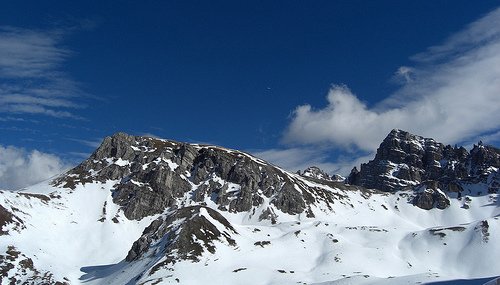
The Alps are the most important freshwater supply of continental Europe. Due to their high elevation, the hydrological cycle of the Alps is largely affected by snow: snow acts as an insulator of the underlying soil while determining the vegetation distribution and phenology and reducing the surface temperature by reflecting solar radiation.
Global warming is believed to be responsible for the reduction of snow amount and duration over the Alps. In fact, a rapid shortening of the snowy season has been measured and perceived by ecosystems and society in the past 30 years, despite the large year-to-year variability. Moreover, a low-frequency (multi-decadal) variability of snowfall associated with multi-decadal changes in the large-scale circulation has been observed.
In a new study recently published on Environmental Research Letters a team of scientists (among them, CMCC researchers M. Zampieri, E. Scoccimarro, S. Gualdi from SERC Division) showed that spring snowfall low-frequency variability over the Alps is modulated by the Atlantic Multi-decadal Oscillation (AMO), while reporting the occurrence of synchronous shifts of the AMO phase and spring snowfall amount.
The abstract of the paper:
Global warming is believed to be responsible for the reduction of snow amount and duration over the Alps. In fact, a rapid shortening of the snowy season has been measured and perceived by ecosystems and society in the past 30 years, despite the large year-to-year variability. This trend is projected to continue during the 21st century in the climate change scenarios with increasing greenhouse gas concentrations. Superimposed on the long-term trend, however, there is a low-frequency variability of snowfall associated with multi-decadal changes in the large-scale circulation. The amplitude of this natural low-frequency variation might be relatively large, determining rapid and substantial changes of snowfall, as recently observed. This is already known for winter snowfall over the Alps in connection with the recent tendency toward the positive phase of the North Atlantic Oscillation. In this study, we show that the low-frequency variability of Alpine spring snowfall in the past 150 years is affected by the Atlantic Multi-decadal Oscillation (AMO), which is a natural periodic fluctuation of Northern Atlantic sea surface temperature. Therefore, the recently observed spring snowfall reduction might be, at least in part, explained by the shift toward a positive AMO phase that happened in the 1990s.
Read the integral version of the paper:
Zampieri M., Scoccimarro E., Gualdi S.
Atlantic influence on spring snowfall over Alps in the last 150 years
2013, Environmental Research Letters, Volume 8, number 3, DOI: 10.1088/1748-9326/8/3/034026


